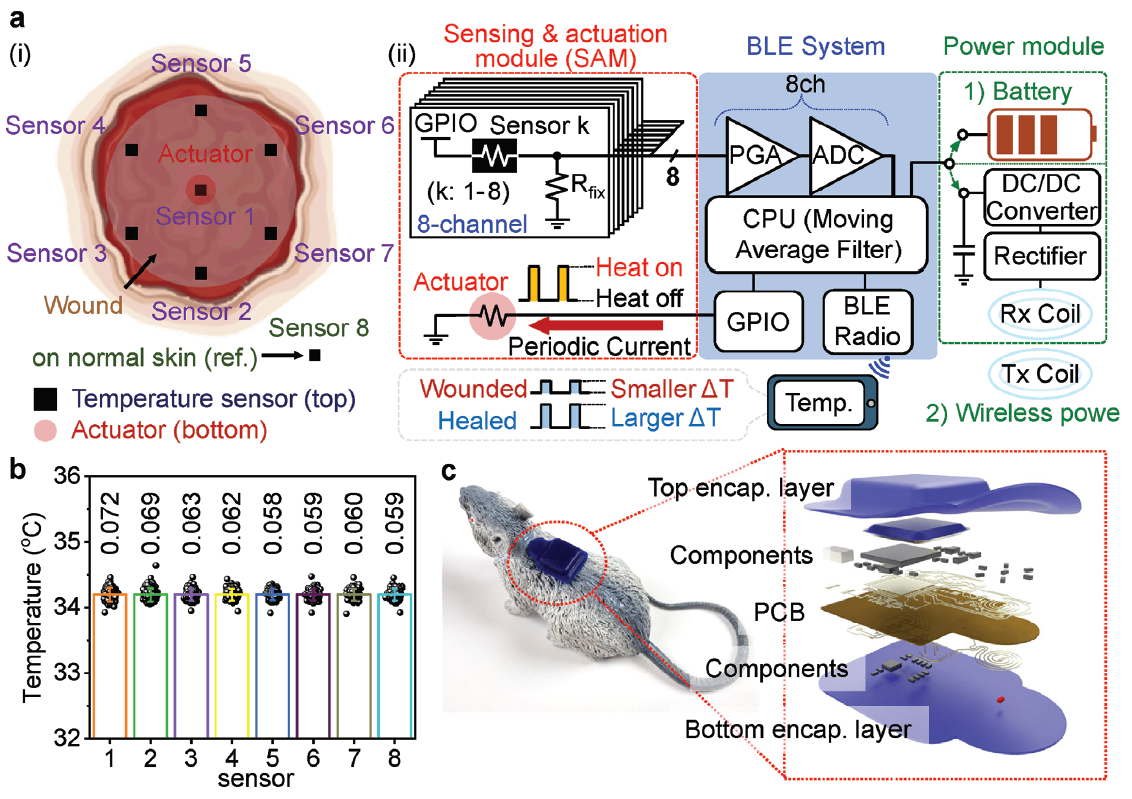Reviewed by Lexie CornerMar 13 2024
A research team from KAIST has devised an efficient wireless system for monitoring the wound healing process. This system tracks spatiotemporal temperature changes and heat transfer characteristics of damaged areas, particularly focusing on conditions like diabetic wounds.
 Schematic illustrations and diagrams of real-time wound monitoring systems. Image Credit: Korea Advanced Institute of Science & Technology (KAIST).
Schematic illustrations and diagrams of real-time wound monitoring systems. Image Credit: Korea Advanced Institute of Science & Technology (KAIST).
On March 5th, 2024, KAIST, represented by President Kwang Hyung Lee, unveiled that the research team led by Professor Kyeongha Kwon from KAIST’s School of Electrical Engineering, in collaboration with Professor Hanjun Ryu from Chung-Ang University, has pioneered digital healthcare technology. This innovation enables real-time tracking of the wound healing process, facilitating timely and suitable treatments.
The skin acts as a crucial barrier, shielding the body from harmful substances. As a result, damage to the skin is potentially perilous for patients requiring intensive care. Diabetic patients, in particular, face heightened risks as complications in normal blood circulation and the wound healing process often lead to chronic wounds.
In the United States, the immense financial burden of addressing such wounds amounts to hundreds of billions of dollars in medical costs. Although numerous methods aim to facilitate wound healing, personalized management is imperative, tailored to the specific condition of each patient's wounds.
A group of researchers studied how skin heals after an injury. They used temperature differences between the damaged and healthy skin to monitor the healing process and measured moisture changes to understand how scar tissue forms. They conducted experiments on mice with diabetes to see how wounds heal under unhealthy conditions and found that their data can help track the healing process and the formation of scars.
To mitigate potential tissue damage during the removal of the tracking device post-healing, the system incorporates biodegradable sensor modules designed to naturally decompose within the body.
These modules disintegrate after use, minimizing the risk of discomfort or tissue damage upon device removal. Additionally, the device holds the potential for intra-wound monitoring, eliminating the necessity for removal.
Professor Kyeongha Kwon, who is heading the research, foresees that ongoing monitoring of wound temperature and heat transfer traits will enhance medical professionals' ability to precisely evaluate the condition of diabetic patients' wounds and administer suitable treatment.
He also projected that the integration of biodegradable sensors enables the device to decompose safely after wound healing, eliminating the necessity for removal and facilitating live monitoring, not only in hospitals but also at home.
The research team intends to incorporate antimicrobial materials into the device, aiming to enhance its technological functionalities for observing and preventing inflammatory responses, bacterial infections, and other complications.
The objective is to create a versatile wound-monitoring platform capable of real-time antimicrobial surveillance in hospitals or homes by detecting changes in temperature and heat transfer characteristics indicative of infection levels.
The findings of this study were featured in the international journal Advanced Healthcare Materials on February 19th, 2024, highlighted as the inside back cover article.
The study was supported by the Basic Research Program, the Regional Innovation Center Program, and the BK21 Program.
Journal Reference:
Ryu, H., et al. (2024) Materials and Device Designs for Wireless Monitoring of Temperature and Thermal Transport Properties of Wound Beds during Healing. Advanced Healthcare Materials. doi.org/10.1002/adhm.202470035.